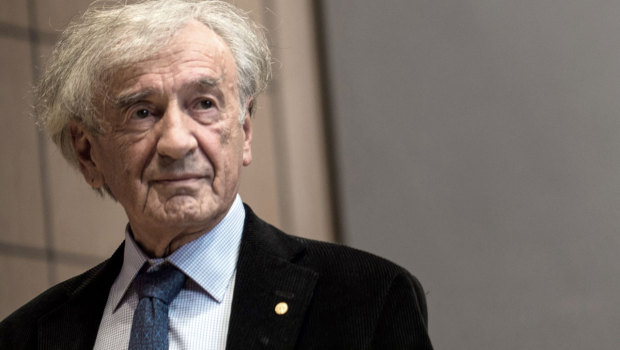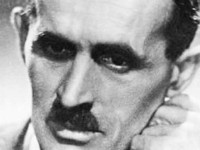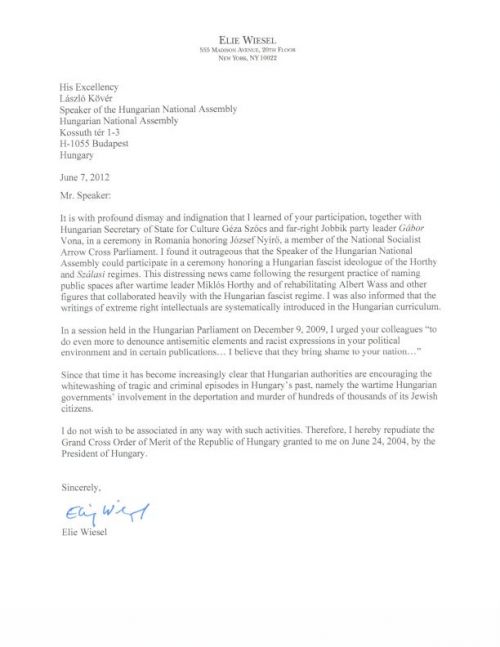Blog
False report that Elie Wiesel showed reporter “his tattoo?”
Written on November 7, 2012 at 2:55 pm, by Carolyn
by Carolyn Yeager
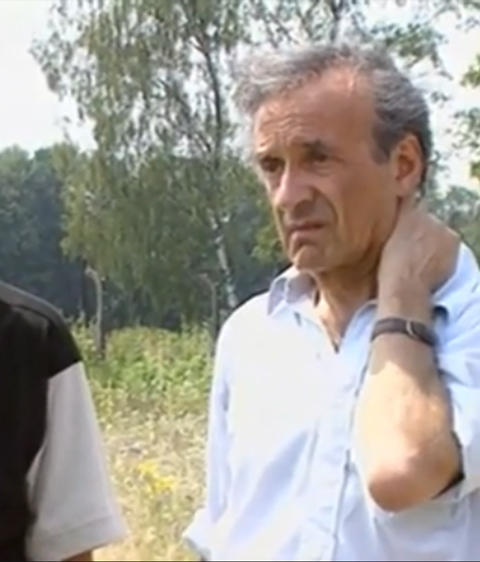 Associated Press reporter Verena Dobnik may be guilty of intentional mis-represention in an AP story published Oct. 8, 2012 in which she said she saw a tattoo on Elie Wiesel’s left forearm.
Associated Press reporter Verena Dobnik may be guilty of intentional mis-represention in an AP story published Oct. 8, 2012 in which she said she saw a tattoo on Elie Wiesel’s left forearm.
The story was carried by many news outlets, including the Washington Times, Seattle Times, Huffington Post, Salon.com, the Bend Bulletin (Oregon), The Sun Chronicle, Flagstaff Today, Deseret News , Yahoo news, The Times of Israel (and other specifically Jewish news media).
No date for the actual sit-down interview is given in the report, which is titled “Elie Wiesel survives Madoff wipeout, heart by-pass,” and was contributed to by another Associated Press writer, Randy Herschaft. This is not the first time Dobnik and Herschaft have worked together. In the news story, Dobnik, who was born in Slovenia and lives in New York, claims to have seen Wiesel’s tattoo but does not describe what she saw. She writes:
He pulls back his left jacket sleeve to reveal a Nazi death camp number tattooed on his forearm as he sits comfortably in his Manhattan office for an interview.
“Usually, I don’t show it,” he says.
One of the exceptions was a 2009 visit to the Buchenwald death camp Wiesel survived, with President Barack Obama and German Chancellor Angela Merkel.
Was this extraordinary claim checked out for accuracy by the Associated Press before running the story? In all of his 62 years in public life (since 1950) Wiesel has never exhibted publicly a tattoo on his left arm. Furthermore, there are some photographs taken over the course of the years in which his bare left arm can be clearly seen (sometimes in bright sunlight, as in the unretouched photo here taken from Wiesel’s own film about a return visit to Auschwitz) and none show any kind of mark on his arm, let alone anything that resembles an Auschwitz concentration camp number.
Where’s the excitement?
Dobnik’s claim is so surprising that it should have garnered excitement from the mainstream media, but just the opposite happened – it was totally ignored and some publications that had originally published the story may have removed it from their online news sites! For this reason, I doubt that this incident ever actually happened; I think it very likely that Verena Dobnik added it to her interview simply because she wanted to. I can’t give her motivations, which may be quite complex. But this part of her interview should have set off a red light for the AP editors, and some questions should have been asked. Not just the seven I list below, but also why she should mention it at all if no photograph proving what she says she saw accompanies the article? I do not, at this point, speculate that Wiesel drew something on his arm and then gave Dobnik a quick glance at it. It seems far more likely to me that Dobnik, as other journalists have done, just added it to her story on her own. I have to add that Wiesel’s handlers and publicity team have not killed the story – so he doesn’t disapprove of it.
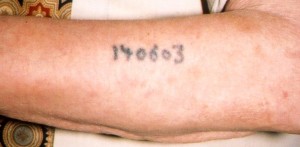 A challenge to Wiesel, Dobnik and the AP
A challenge to Wiesel, Dobnik and the AP
(At left is a detail of a photograph of the left arm of Auschwitz survivor Sam Rosenzweig.) If Wiesel is willing to show his tattoo to the reporter Dobnik, why won’t he show it to the general public and end the questions and swirling speculation about “does he or doesn’t he” have what he says he has? This kind of tease from Ms. Dobnik cannot go unanswered, especially from Elie Wiesel Cons The World where we have been asking this question for two and one-half years – since July 2010 – without ever being shown even a picture of Wiesel’s alleged tattoo. I therefore do not believe this reporter’s story and accuse her of journalistic fraud. She and Mr. Herschaft are clearly biased reporters who favor, and even specialize in, the traditional ‘holocaust’ narrative. I will register this complaint in a formal way with the Associated Press and I urge you readers to do the same. Don’t sit back and expect others to work miracles on your behalf – take action. The more the Associated Press hears about this, the better.
Contact info for the Associated Press: Call AP headquarters at 212.621.1500 or email [email protected] for general inquiries. Here is a List of AP news bureaus and correspondents. AP says they welcome feedback and comments from readers. Send an email to [email protected] and it will be forwarded to the appropriate editor or reporter. Remove any attachments, including email signatures, company logos and disclaimers, to ensure that we receive it. (Don’t attach this article, or even link to it, for best results. It should not appear to be an organized campaign from this website.)
Some questions we can fairly ask of Ms. Dobnik and the AP editors are:
- Does she know what a “Nazi death camp number” looks like? She apparently doesn’t know that Auschwitz was the only German concentration camp that tattooed prisoners, so there is no such thing as a “death camp number,” only an Auschwitz camp number.
- Can she describe what this number tattooed on Wiesel’s arm looked like? And why didn’t she? Did she get a long enough or close enough look at it to be sure of what she “saw?”
- Why would the Nazis tattoo prisoners in a “death camp” who were presumably scheduled for death? If they were not all scheduled for death, why call it a “death camp number?”
- Why does she and the AP continue to call Auschwitz a “death camp” when so many survived, along with their tattoos?
- How does she know that Wiesel showed his tattoo to President Obama and Chancellor Merkel in 2009 during a visit to Buchenwald? The implication is that she had to learn it from him, during the interview, but she doesn’t include this in her report so we don’t know.
- Buchenwald is not listed as one of the supposed “death camps” (they are all outside of Germany proper), so why is Dobnik allowed to call Buchenwald a “death camp.”
- How many other mistakes has this AP reporter made in her dire ignorance of what she is writing about?
Elie Wiesel and Survivor Guilt
Written on September 27, 2012 at 9:39 am, by Carolyn
This article is courtesy of Jett Rucker and Smith’s Report, where it appears in the current issue.
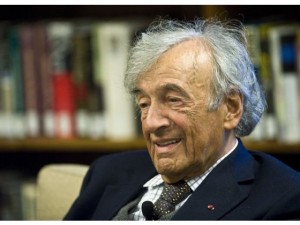 Since Elie Wiesel is “the world’s most famous Holocaust survivor,” I asked Mr. Rucker if I could post his article here. It does an effective job of putting the term “holocaust survivor” into a more realistic context – one that includes all “survivors.” I have added the sub-headings and pictures, and done very slight editing (removing some phrases in parentheses) for ease of reading.
Since Elie Wiesel is “the world’s most famous Holocaust survivor,” I asked Mr. Rucker if I could post his article here. It does an effective job of putting the term “holocaust survivor” into a more realistic context – one that includes all “survivors.” I have added the sub-headings and pictures, and done very slight editing (removing some phrases in parentheses) for ease of reading.
Of course, my position remains that it is doubtful Elie Wiesel was in the camps at all. Thus, his “survivor guilt” might be even greater than if he were, and survived. Can that explain his lifelong campaign on behalf of keeping “Memory” alive of what occurred, both fictitious and real? Some might think so, but perhaps a better explanation is plain old opportunism. The many favors and privileges Wiesel has obtained throughout his lifetime are based on his “survivorship;” keep that in mind as you read the following.~cy [Image: Ye olde survivor Elie Wiesel has lived the good life, as his contented face reveals.]
Survivor Guilt
by Jett Rucker
“Survivor guilt” has come into popular usage as an irrational complex on the part of people who are among a very small number of people who, by sheer happenstance, have emerged alive from a disaster that took the lives of many others who seem to have deserved no more (or less) to have survived than they (the survivors) did. Occasionally, for example, a plane crash occurs from which one, or perhaps two, victims emerge relatively unscathed, while all their fellows perished in the catastrophe. The complex plagues them for years after the event, in some cases.
Now and then, though, some sort of more-genuine guilt may seem to attach to the fact of survivorship, as in the case of the (surviving) members of a Uruguayan rugby team who committed (and admitted to) cannibalism in the process of surviving two months on a remote peak in the Andes where their plane had crashed in 1972. The surviving cannibals were absolved of their “sin” by the Pope, whom both the perpetrators and, presumably, the victims acknowledged as their spiritual shepherd.
A stronger presumption of actual guilt on the part of survivors might attach, say, to adult male survivors of the Titanic sinking in 1912, as they might be suspected of having violated or otherwise evaded the famous stricture supposedly invoked at the time, “Women and children first.” Some male passengers apparently did that, while others are thought to have boarded life boats that were about to depart the sinking vessel with empty seats in them.
The dead have not been heard from …
And then, there are those long-term situations imposed by a hostile group of others, in which a potential for treachery, betrayal, collaboration, or even fouler play might enter the picture. In the annals of human conflict, undoubtedly war provides the greatest number of these situations, especially if they are rated by numbers of either: (a) dead victims, who cannot testify as to what occurred; or (b) survivors, who perforce provide the only narratives available as to what occurred. Be it noted: neither group, not individually nor collectively, is in a position to even understand all of what did happen, quite aside from what might have happened had anyone acted differently from the way they did.
War veterans are no doubt the most-numerous of the groups that fit the description above, including both those who survived and those who, not surviving, never gained the exalted status of veterans. I often wonder how the glories of past victories (and defeats) might be perhaps somewhat dimmed if the voices of the dead might be heard on the occasions when the glories are celebrated among the survivors and their putative beneficiaries.
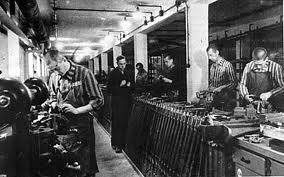 War Industry Workers: “survivors” or veterans?
War Industry Workers: “survivors” or veterans?
A very special, if demographically dwindling, group remains in our midst who command, and lately often claim, reverence that is not accorded even to veterans of this (or other) nation’s wars. These are those who claim to have been forced by the National Socialist regime that governed Germany from 1933 to 1945 to leave their homes and properties in Germany for resettlement or labor camps to the east of Germany because they were Jews, as well as those Jews resident in countries east of Germany who were dragooned into service in Germany’s war-industry plants such as those in Birkenau, Dora-Mittelbau, and over a thousand other locations: “Holocaust survivors,” as they style themselves.
Such persons (the genuine ones among the many claiming such status with no basis whatsoever in truth) are survivors, if at all, only in the sense that anyone residing in Germany or Austria by the time World War II reached its catastrophic end was a survivor. What they survived was not forced labor (to which many were indeed subjected), but the blanket devastation wreaked by Allied bombers upon the domiciles of the entire populace of their “targets.” Insofar as their survival involved their conscription into forced labor in war-industry factories, such fortunates may as well be designated “veterans” as their less-fortunate predecessors were conscripted to go to the front, there to confront the irresistible onslaught of Soviet manpower and American productivity.
Be all this as it may, all an elderly Jew in America with any sort of claim to European origins need do to command instant respect and credulity among those around him or her, is to invoke the sacred appellation, “Holocaust Survivor.” Once this is done, silence reigns all around, and rapt attention is reflexively granted by all those in attendance, they all having long since been conditioned to render such obeisances upon hearing the Pavlovian Bell.
Jewess Anna Breslaw questions the innocence of “Holocaust survivors”
 An intrepid, if possibly naïve, American Jewess of unwonted analytic disposition, Anna Breslaw, writing for the Tablet, ventured the irrefutable speculation that some of the few genuine “Holocaust survivors” among those many claiming the vaunted status might, indeed, have survived the parlous times they undoubtedly went through, by way of guile, or even treachery, in a few cases.* She did not trouble her argument with particulars as to how her co-religionists might have collaborated, contrived, betrayed, or otherwise arranged for themselves the favored treatment that enabled them to “survive,” but the force of her argument was sufficient to rouse into action none other than that Centurion of the Sanctity of the Holocaust Mythology, Jeffrey Goldberg of the Atlantic Magazine. He styled Breslaw’s impeccable logic as “ghastly.”
An intrepid, if possibly naïve, American Jewess of unwonted analytic disposition, Anna Breslaw, writing for the Tablet, ventured the irrefutable speculation that some of the few genuine “Holocaust survivors” among those many claiming the vaunted status might, indeed, have survived the parlous times they undoubtedly went through, by way of guile, or even treachery, in a few cases.* She did not trouble her argument with particulars as to how her co-religionists might have collaborated, contrived, betrayed, or otherwise arranged for themselves the favored treatment that enabled them to “survive,” but the force of her argument was sufficient to rouse into action none other than that Centurion of the Sanctity of the Holocaust Mythology, Jeffrey Goldberg of the Atlantic Magazine. He styled Breslaw’s impeccable logic as “ghastly.”
Goldberg advanced the view of what he hopes might still be the dominant view of Jewish and Jewish-conditioned readers of his widely circulated platform. Maybe it is, and maybe the Tablet has got the ear (mind, heart) of thoughtful readers of both (or all) publications. Goldberg’s time-worn imprecations bear inspection, as do Breslaw’s rather more-nuanced comments, made, be it noted, in a context rather remote from the ones implied in Goldberg’s tirade.
Can real “Holocaust survivors” really be innocent?
Breslaw’s well-considered cautions arrive on the American scene at a critical time when real “Holocaust Survivors” have faded from the scene that they never had the temerity to dominate in the first place, but self-qualified “survivors” have taken their place to affect shock and affront at such “disparagements” as Breslaw offers. Real “Holocaust survivors,” keenly aware from genuine experience what moral ambiguity attends the status to which they could lay claim, have always remained reticent in proclaiming the particulars of their experiences, and acts. Those many who lack this experience, but claim it by implication, let on as though they were blameless both in terms of their incarceration in the first place, but further—and this is the stretch—as to their deportment while actually incarcerated.
The act can be pulled off only by those quite innocent of the genuine experience. Those who affect utter innocence in the fates they claim may be dismissed as being innocent not only of guilt, but also of the experiences they claim to have.
As for Goldberg, and his magazine, we may consign them to a category reserved for those liars who propose to benefit from the success that may be enjoyed by still other liars.
*Of particular interest to us is this passage by Breslaw:
… in grade school I received the de rigueur exposure to the horror—visiting geriatric men and women with numbers tattooed on their arms, completing assigned reading like The Diary of Anne Frank and Night. But the more information I received, the less sympathy the survivors elicited from me. Each time we clapped for the old Hungarian lady who spoke about Dachau, each time Elie Wiesel threw another anonymous anecdote of betrayal onto a page, I eyed it askance, thinking What did you do that you’re not talking about? I had the gut instinct that these were villains masquerading as victims who, solely by virtue of surviving (very likely by any means necessary), felt that they had earned the right to be heroes, their basic, animal self-interest dressed up with glorified phrases like “triumph of the human spirit.”
Guest editorial: Elie Wiesel wins new literary honors
Written on August 5, 2012 at 9:23 am, by Carolyn
By furtherglory
(First published at Scrapbookpages Blog on August 2, 2012)
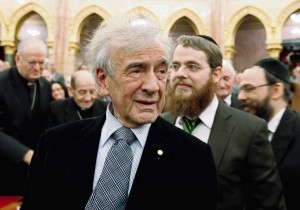 Yesterday the online Chicago Tribune had an article which reported that “In recognition of [Elie] Wiesel’s vast contributions to the art of the printed word, which includes more than 50 works of fiction and nonfiction, he has been named winner of the 2012 Chicago Tribune Literary Prize.”
Yesterday the online Chicago Tribune had an article which reported that “In recognition of [Elie] Wiesel’s vast contributions to the art of the printed word, which includes more than 50 works of fiction and nonfiction, he has been named winner of the 2012 Chicago Tribune Literary Prize.”
[Photo of Wiesel at left is from December 2009 in Budapest, Hungary. ]
After reading this article, I immediately checked out Carolyn Yeager’s website Elie Wiesel Cons the World to see what she has to say about this new honor for Elie Wiesel. I found a video which explains the whole story of Elie Wiesel in great detail. The video starts out with the sound of an old fashioned typewriter as the keys hit the paper, typing out the URL of the website. I love it!
The sound of the typewriter keys brought back a flood of memories; I was alive during World War II and I saw the news reels of the liberation of Bergen-Belsen and read about the liberation of Dachau. Yet I didn’t get interested in the Holocaust until many years later. My lack of interest in the Holocaust was nothing unusual, as the video on Yeager’s website points out.
The article in the Chicago Tribune also points out that there was very little interest in the Holocaust as late as 1960 when Elie Wiesel’s book Night was first published in English.
This quote is from the Chicago Tribune:
After the war, [Elie Wiesel] worked as a journalist in France for Yiddish and French publications. The noted French writer and Nobel laureate Francois Mauriac urged Wiesel to write his Holocaust memoir, and Mauriac “went from one publisher to another,” said Wiesel, to persuade them to take on Wiesel’s book.
At first, “Night” generated little interest, and the English-language publication in 1960 “sold 5,000 copies in three years,” Wiesel said. “And the same thing, by the way, in France — everywhere.”
Why was the world slow to recognize the book’s value?
“Maybe it needed — the world itself needed maybe a whole generation for readers to realize that they must know something more” about the Holocaust, Wiesel said.
As a person who was alive and well between 1945 and 1960, I can tell you why no one was interested in the Holocaust during that period. The years after World War II were the best of times. During the 1950s, everyone was extremely happy to be living during peace time; no one wanted to re-live the war. I was writing and selling magazine articles during the 1950s, but not stories about the Nazi concentration camps, which would not have been of interest to very many people at that time. There were thousands of Holocaust survivors in American during those years, but they were keeping their mouths shut and hiding their tattoos.
I lived in Germany for two years after World War II, but I didn’t bother to go to see the former Dachau camp. When I went back to Germany for the first time in 1995, I didn’t go to see the Dachau Memorial Site. The Holocaust did not become as popular as it is now until many years later. If only I had anticipated the Holocaust mania, I could have written a novel about Auschwitz and Buchenwald and become a millionaire. Many people have urged me to write a fake Holocaust memoir, but I think it is too late for me; there are too many fake memoirs on the market.
I was one of the first to put the information on the Internet that Elie Wiesel could not have been in the famous photo taken in Barrack 56 in Buchenwald on April 16, 1945 because, by his own account as written in his book Night, he was in the camp hospital on that date. You can read that page on my website, which I updated 3 years ago, here.
Elie Wiesel in a fit of pique over honor for Hungarian writer
Written on June 19, 2012 at 11:46 pm, by Carolyn
Elie Wiesel in 2012
By Carolyn Yeager (edited on June 21st)
Elie Wiesel is making news again by repudiating a Hungarian Government award he received in 2004. By this gesture, he apparently hopes to intimidate independent nation-states to take into consideration Jewish Power – Holocaust-Power – in every decision they make. Wiesel also likes to gain public attention for what he alleges to be the crimes of the Nazis and their collaborators.
The award Wiesel is returning (or is he? I cannot confirm that) is the Republic of Hungary’s Order of Merit, Grand Cross presented to him by president Ferenc Madl in 2004. Let’s hope he never gets it back.
Wiesel said last week that he was “outraged” that Hungarian House Speaker Laszlo Kover participated, together with Hungarian Secretary of State for Culture Geza Szocs and far-right Jobbik party leader Gabor Vona, in a re-burial ceremony in Romania honoring author Jozsef Nyiro, who was a member of the Arrow Cross Parliament during the 1930′s.
“It’s just too close to home,” Wiesel told an Associated Press interviewer. In a letter to Kover, he wrote “It is with profound dismay and indignation that I learned of your participation” with Szocs and Vona in a ceremony honoring “a fascist ideologue of the Horthy and Szalasi regimes”.
Background on Nyiro
From The failed reburial of József Nyirő in Transylvania, May 30, 2012 in the Buda Post:
József Nyirő was a Catholic priest who became a writer after Transylvania was annexed to Romania in 1920. His works, according to the government’s new draft curricula, should in future be taught in Hungarian high schools. In 1941, after the re-annexation of Transylvania to Hungary, Nyirő became a Member of Parliament in Hungary and as such went into exile in 1945. He died in Spain in 1953, and his last wish was to be buried in his homeland. At the initiative of the Hungarian Civic Party (MPP), a small Hungarian ethnic party in Transylvania, the Office of the Hungarian Parliament initiated his reburial. The new Romanian government, however, regards Nyirő as a Hungarian irredentist writer. Nyirő’s reburial, which was scheduled for Sunday (28 May) was cancelled after the Romanian authorities withdrew permission, claiming that the document carried the wrong registration number. Romanian PM Victor Ponta called the reburial a provocation.
A commemoration event was held instead of the reburial. What Elie Wiesel objects to is that three Hungarian officials attended the commemoration. Wiesel wants all-out condemnation of anyone and everyone who is painted as a “far right National-Socialist, fascist or antisemite.”
Here is the letter that Wiesel wrote to the Speaker of the Hungarian National Assembly. Sorry it is such poor quality. He writes in paragraph two that in 2009 he urged members of the National Assembly “to do even more to denounce antisemitic elements and racist expressions in your political environment and in certain publications … I believe they bring shame to your nation.”
He writes that since that time it has become worse, that Hungarian authorities are “whitewashing” Hungary’s criminal past.
Finally, “I do not wish to be associated in any way with such activities. Therefore, I hereby repudiate the Grand Cross Order of Merit … given to me on June 24, 2004 by the President of Hungary. He doesn’t say he is returning it, does he. But it is so reminiscent of his statements that he does not want to be in the same room with a “holocaust denier.” He clearly feels he’s being contaminated by those whose views are opposite to his.
And there is the famous Wiesel signature which doesn’t resemble at all the signature on the U.S. Military Questionaire signed by Lázár Wiesel in 1945. It was I who first thought to compare the signatures and brought it to light in September 2010.
New “Elie Wiesel Cons The World” video
Written on June 9, 2012 at 7:30 am, by Carolyn


